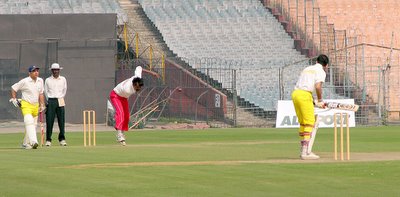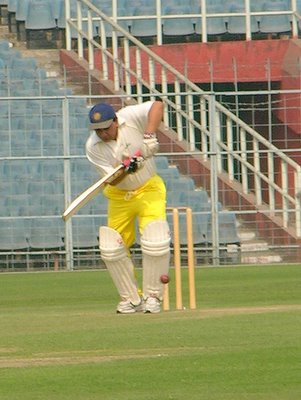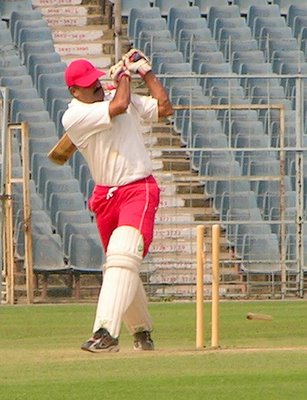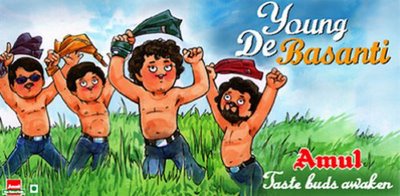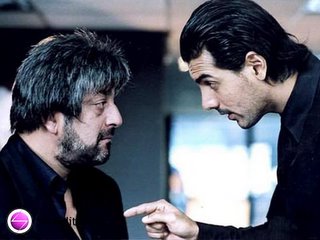I now have this chip on my shoulder. A tracking chip, I suspect. One of those things DHL and FedEx use, and it’s more IN my shoulder than ON it. A tag, a meme even. This person fired it in to begin with, and now she’s waggled it about a bit. That plays the very devil with my old bones, you know how it is, rheumatism and the gout and all that, so here goes in enlightened self-interest….
Just a minute... Hold it right there, me hearties. You want to hear me ramble on about books? Luvverly. Could go on forever. Or almost. But it’s not fair to tie me down to categories and numbers. Deal? (Statutory warning - I have read nothing by Banville, Barnes, Ishiguro, Morrison, Murakami or Ondaatje. I detest Arundhati Roy. I've had it up to here with magic realism. I love Amitav Ghosh but have not yet read The Hungry Tide. I haven't even read Two Lives for fear it will not live up to the breathless romanticism of An Equal Music. Salman Rushdie will not be mentioned again here. Read on, then, only if you can suppress the shudder of disgust at this semi-literate posturing.)
Here goes, again. (But you’ll be sorry!)
Total number of books owned – Tough call. Does one include the early Ladybird books and the Noddy series, a couple of hundred Armada publications (Auntie Enid had two full shelves to herself!), the Three Investigators, William, Amar Chitra Katha and Classics Illustrated? Does one count only books one values or the motley James Hadley Chases and the odd tattered copy picked up from a sidewalk vendor for five rupees (e.g. The Discourses of Epictetus, I actually read it through one weekend, now I have no idea why)? Can one leave out Aabol Taabol and Thakurma’r Jhuli just because they’re not in English? What about the trunks full inherited from my grandfathers? Or the stuff that mysteriously accumulates in my parents’ place, so familiar and yet rather strange, like women who wave at me in multiplex foyers, whom I KNOW I know but I don’t know who the hell they are …
Sneck up, you havering awd coot, gi’e the childer a number. Well … 1500? 2000? Spread over three distinct locations, including all the favourites I had as a child, NOT including the bad debts that I shall never retrieve but including all books that have remained with me for 2 years or more (regardless of their original owners. Fair trade, surely) - a couple of thousand, then. Give or take a hundred.
Last book I bought – Lynne Truss’ Eats Shoots and Leaves. Needs no introduction. Also (in Bangla) the complete short stories of Satyajit Ray. A large number of them are now available in a very good English translation by Gopa Majumdar, but I’m afraid the essential appeal lies in their very Bangaliyana and that doesn’t translate perfectly. Der Boss is not like Amit Chaudhuri in that he does not recreate and present a Bangali ethos, he is Bangali.
(Digression – life-changing moment. A few weeks after 9/11, fretting all night by a chilly window in New Jersey over whether I should stick with a PhD ‘program’ stateside or cut my losses and return to my beloved Calcutta, I plugged into the VCR a recording of some Satyajit Ray interviews. And the Man was asked whether he regretted not having moved to Bombay or even to Hollywood in pursuit of his cinema. In that inimitable rumbling bass, his speech a mellifluous synthesis of Oxford studies and Calcutta baithakkhanas, he said ‘Wellll … my roots are in Calcutta. I grew up here, I have worked here all my life, my inspiration is here. I do not (did he ever say ‘don’t’? I cannot recall an instance) think my creativity would have survived my moving to another city”. Eureka! My decision was made for me!)
(Digression #2 - I loved A Strange and Sublime Address. It’s easily one of the most evocative accounts of childhood that I have encountered, probably because it mirrors my own experience so closely. I learnt from Amit Chaudhuri how observation of the seemingly trivial details of the everyday can fill in the background of a word-picture. And I hated him for having written it, and written it so much better than I ever could. My big mouth … when I met him for the first time, I told him “I resent your having written the book I always wanted to write”. Ever the perfect gentleman, his response - after the first incredulous stare - was a polite smile instead of “Yeah right, you and Proust both!”)
Last book I read – I have a very low attention-span. I usually read about three books simultaneously, dipping into them in greedy little interludes rather like a sticky-faced Bunter in a Fifth Form study. I have to choose one from the pile.
The last book that I read with undivided attention was Elizabeth Kostova’s The Historian. It’s a … well, call it a research mystery. (Not, of course, as successful as Dan Brown’s opus, because it has certain shortcomings. Ms. Kostova wastes time on characterisation. She describes people, places, events. She drifts into history. She creates atmosphere. She even goes so far as to write good English. Worst of all, she actually writes about research! So obviously she can’t begin to approximate the phenomenal success of our Master of Moronicity. She can’t write a “threatening silhouette with glowing eyes”. )
The Historian is not just about things that go bump in the night. It’s a travelogue, a glimpse of history, a very different kind of detective mystery and a love story. Several love stories, in fact. The love of a student for his teacher, love between man and woman, boy and girl; the love a daughter bears her father and above all, the obvious love of a bibliophile for books and knowledge. I felt let down by the last 30 pages or so. It appeared she hadn’t plotted the ‘climax’ carefully enough. But in this book, the journey is far more important than the destination.
Currently reading – well now, let me see. There’s The Manticore’s Secret. (All right, I cheated, I finished that after I started writing this post. But surely we senior citizens can take some liberties!) I didn’t enjoy it as much as I did the first book (The Simoqin Prophecies, go read it, preferrably after buying it rather than borrowing it, thus increasing my chances of sunny company when I next visit Delhi).
For one thing, if you must write an epic, write it in 900 pages and not 470. You just need more time to develop each strand, otherwise it reads like L. Mukherjee’s history books. Furthermore, I sadly fear our favourite Duck has let himself be subverted by Serious Thoughts. Always a mistake; in this case, it has led to too much talky-talk. Endless pages where Gods, politicians, magical beings expound their philosophies and agonise over their possible courses of action. Where’s the meat, bub?!
Perhaps I’m unfair in expecting a lighter touch, in demanding soufflé instead of dark truffle. There are some delicious bits, like a phalanx of Minotaurs called the Vindiciti Hoplites. The angriest of them is Jekl Amota. And of course, the umbawa or chameleon whose mantra is Eitiktikitamohapichonpaka. (You won’t get the point if you don’t know Bangla).
What else? A collection of Rudyard Kipling’s Humorous Tales. The man was so prolific, he was essentially a pen-and-ink blogger a hundred years ahead of his time. I think his stories of the “Soldiers Three” are among his best characterisation, the dialogue (even with all the faux accents) always a delight. (One could argue that The Man who would be King grew out of these stories.) Some of the other stories here are no better than average, but they show the craftsman at his work. More of which later.
Peter Hopkirk’s The Great Game, an account of the (largely) silent struggle between Britain and Russia to gain control over Central Asia, from the 18th to the early 20th century. Hopkirk is a decent writer who appreciates and tries to emulate great writing although he doesn’t quite have the touch of greatness himself. His research and the scale of his subject-matter, however, make this a very rewarding read. (His first line grabs the attention – “It was said one could smell them even before one heard the sound of their horses’ hooves”) Think of it – the sweep of rugged terrain from the Caspian Sea, across the Persian Desert, over the western outcrops of the world’s highest mountains, through the tortuous passes of the North-West Frontier and on to the Roof of the World. Soldiers, spies, adventurers, despots, disguises. Intrigue, violence, bravery. Infallible recipe, best illustrated by the story of Col. F.M. Bailey, British officer and adventurer who traveled through Central Asia in disguise and in peril of his life. Until one day in Tashkent the Cheka, the Tsarist secret police, tried to recruit him for a specific mission - to find and assassinate a notorious British agent named Bailey! (Bailey’s own account, A Mission to Tashkent, also suffers from stolid prose and an irritating attention to minor detail, but again, the story is too wonderful to be buried under poor writing.)
Paperweight, a collection of articles that Stephen Fry wrote for The Listener and The Daily Telegraph. Often funny, usually witty, keenly observant, casually erudite and always well-crafted. Fry is one of those writers who are good even when they are bad. I must confess that I don’t always enjoy his novels with their darkling farce and their accounts of agonized homosexuality, but this collection is just right for my ‘dip-dip-dip’ style of reading.
Foucault’s Pendulum (by Umberto Eco, and if you have to ask, you can come and share a smoke with me while we both try to work it out). Never mustered the courage earlier, have taken the plunge this time. No more at this point!
Finally, a book that I have had by my side for some months now. My friend and guide in Delhi, quite an expert on the history of science, said he was disappointed in this book. I, on the other hand, love it and come back to it every other day. Bill Bryson’s A Short History of Nearly Everything. The joy of reading about science in a lucid account, and a fleeting feeling of virtue at the betterment of self!
Books that have meant a lot to me – Five? Just five in nearly 40 years? Pshaw! Fiddlesticks! I intend to step high, wide and plentiful, and if you don’t like it you can go read a biography of Narendra Modi! The tough part is to keep it down to a hundred. On the other hand, I just advised somebody (only after the said somebody sought my advice, I hasten to add) to keep it short. Considering this post is already 1500 words and counting, perhaps I should keep it down to 5. But how?
The complete works of P.G. Wodehouse. Cheating? All right, Wodehouse on Wodehouse. Still cheating, because this is three books (Bring on the Girls, Performing Flea and Over Seventy) in one, but this is my list! Apart from the sheer joy of seeing the Master at close quarters, this volume repeatedly drives home the overweaning importance of hard work and discipline. I have earlier listed the reasons why I consider Wodehouse "the finest writer of English in the 20th century”. His virtuosity was that of an honest and sincere craftsman, the kind who cleaned his typewriter regularly so that he wouldn’t lose a good idea to a stuck key. Not everybody can be a Douglas Adams, who loved “the whooshing noise of deadlines as they flashed by”. PGW wrote every day - every day of his life for 70 years, including three and a half years in prison camps. I’ll try for 1000 words a day, Sir P. And pay homage in my own way to PGW and the Beetle. As the Bouncer wrote recently, the only way one can learn how to write well is to read and write and read and write. And then read and write some more.
The Once and Future King, T.H. White. History, fantasy, allegory – difficult to categorise this magical re-telling of the Arturian legend. I choose this over The Hobbit (which again is far far superior to TLOTR, an over-blown and self-important heavyweight that occasionally descends to the levels of the later Harry Potters) because it has more moods, more introspection, more drama, much more laughter (and more sex!) without becoming maudlin or preachy. The first volume, The Sword in the Stone, provided the basis for the Disney animated film; the fourth, The Candle in the Wind, is closer to Excalibur. How’s that for wide-spectrum?
Zen and the Art of Motorcycle Maintenance, Robert Maynard Pirsig. Because it explained that philosophy is no more than thinking things through. Because it wove personal trauma and general principles into a story. Because it made me address my own mental block about technology. Because it gave me a glimpse of how terrible it would be if I could no longer think. Because it made me think.
English, August by Upamanyu Chatterjee. The parallels with my own experience kept me sane through one rather difficult year of my life. I even found a toad in my bathroom in the Circuit House. (My copy, bought in 1991, has a line from Paul Simon’s Kathy’s Song on the fly-leaf: “There, but for the grace of you, go I”. We too were young once.) Read with John Beames’ Memoirs of a Bengal Civilian – the more things change, the more they stay the same. And Philip Mason’s (or Woodruff’s) two volumes on The Men who Ruled India.
Cheat update - how could I forget H.E. Bates' "The Darling Buds of May"? And John Hadfield's "Love on a Branch Line", which is more of a 'novel' but far less of a romp. Two stories with similar themes, the first published in 1958 and Hadfield's in 1959. Coincidence or .. ? Both adapted for television, and I assure you that I loved the Pop Larkin series long before a certain Welsh lady appeared in The Darling Buds on TV (but oh, those brandy eyes, that sinfully amused mouth!). I mean, look at what these books pack for me. Civil servants giving in to hedonism (also civil servants as symbols of strait-jacketed, deprived, mentally fettered life. But I shall let that pass). Lots of food. Innocent, fun-loving sex. The English countryside. Nightingales and other music. How could I not stay in love with them? (Self-consciously learned aside - the 'May' here is not the month but the flower of the hawthorn. Has found favourable mention in the works of Shakespeare, W - Rough winds do shake the darling buds of may - and Wodehouse, P.G., secondary source - Of all the mad new year this is the maddest merriest day / For I am to be Queen of the May, mother, I am to be Queen of the May)
A slew of travel writing keeps me dreaming, from Pico Iyer’s Falling off the Map through Paul Theroux – brilliant in Riding the Iron Rooster, petulant and tedious in The Pillars of Hercules – to my much-favoured Bill Bryson, the master of the micro-view and the puckish aside. Eric Newby is one writer who travels better than he writes, though A Short Walk in the Hindu Kush is an undoubted classic. His anthology, A Book of Travellers’ Tales, should be prescribed reading; if this does not inspire wanderlust, nothing will. For myself, even a Frommer’s Guide can set me off.
And of course, all the men (and the few women) who make me laugh. The first four volumes of Spike Milligan’s war memoirs, and Puckoon. Mr. Hatterr. The Trilogy in Five Parts. Ascerbic verse from Dorothy Parker. Long ago, Betty MacDonald and Onions in the Stew. Tom Sharpe. Over the last two years, Terry Pratchett. (In all fairness, I should also mention Charles Devereaux and Venus in India, my first exposure to erotica.)
Enough! Or wait … poetry! A forty-year* old edition, the white binding now grey with fingering, the edges frayed. The Guvnor’s Collected Poems. And the Norton Anthology of English Literature, circa 1982. Poetry of the Thirties. I read anthologies rather than single volumes. Enough now!
Cheating again with a wrap-up – Books I want to buy? The Greater Oxford English Dictionary. The complete works of Terry Pratchett. The Argumentative Indian . Agastya Sen's return in The Mammaries of the Welfare State. (These are also the only books that come to mind immediately, in the category of books that have caught my fancy but which I haven’t read) Anthologies of detective fiction, travel writing, humour. A few dozen annuals from Wisden and Punch. All of Bill Bryson, epecially the one I haven't read, The Mother Tongue. All the Pop Larkin books by H.E. Bates. The updated Oford Book of Humorous Verse. Anything, really. Oh yes - I must shamefacedly confess that I've read very little of Neruda or Rilke. It's time I plugged that gap in my education.
Books I’ve owned but never read? Can’t think of any, unless one counts obscure treatises on sociology and criminology that appeared in our box-room some years ago. Whom do I pass this to? Really, I would not presume. But if any reader thinks this is a good idea, I warn you, it's a Sisyphean task. (This is at least the fourth time I've come back to this post to amend or add ..)
All talked out. Sorry, this has gone on far too long. But “if you prick us, do we not bleed?” If you will goad me into a book-ramble, can you blame me for losing myself on the way? I've tried to make amends by putting in as many links as possible. Those, at least, should go some way to keep the reader from rating this an utter waste of time. Happy clicking!
**** ****
* - thanks for the correction, Falstaff
